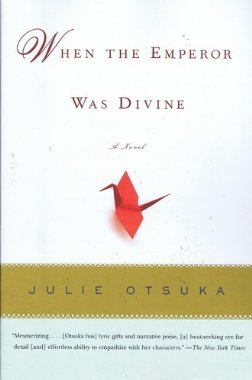
Title: When the Emperor was Divine
Author: Julie Otsuka
Publication: October 14, 2003
Series or Standalone: Standalone
Paperback or Hardback: Paperback
Acquired: Bought used from Second and Charles
Pages: 144
Rating: 5 stars
Summary:
On a sunny day in Berkeley, California, in 1942, a woman sees a sign in a post office window, returns to her home, and matter-of-factly begins to pack her family's possessions. Like thousands of other Japanese Americans they have been reclassified, virtually overnight, as enemy aliens and are about to be uprooted from their home and sent to a dusty internment camp in the Utah desert.
In this lean and devastatingly evocative first novel, Julie Otsuka tells their story from five flawlessly realized points of view and conveys the exact emotional texture of their experience: the thin-walled barracks and barbed-wire fences, the omnipresent fear and loneliness, the unheralded feats of heroism. When the Emperor Was Divine is a work of enormous power that makes a shameful episode of our history as immediate as today's headlines.
Review:
When the Emperor was Divine is the companion novel to The Buddha in the Attic which was written first and is her debut novel. I decided to be informed on the back story before I read her first book and I stand by this decision.
I have not read any books in the fiction genre that deal with the existence of the internment camps for Japanese Americans so this novel immediately peaked my interest. I was not sure what to expect but I was certainly not disappointed. The most gripping thing about this novel is that the main characters do not have names and all the other minor characters have an identity and are acknowledged by the main characters. This goes along with the theme of the story in which the people who were put in these camps by the U.S. government were stripped of their identity. In order to "prove" that they were not spies they were forced to strip down their heritage and denounce all ties to their family back in Japan.
I loved all of the characters and we get to see a little bit from the point of view of the mother, the sister, the brother, and the father. The father was already in a camp at the beginning of the story so we don't really hear from his point of view for a while except through the letters that he sends to his family. The rest of the family is packing up their house in anticipation of being sent to a different internment camp in the middle of the desert. The two children in the beginning are able to keep up their morale and handle things with that sense of childlike wonder and innocence. They understand that they have to go away from home but they do not understand the full significance of what is going on in the world and in the United States. Overall the book does a great job depicting the fear and hopelessness that the people in these camps felt while they were there. I liked that the story continued on after their release and showed the struggles that the main characters faced when they returned home. People were still not very accepting of them because of their heritage which only added to their sadness and loss of identity. The author also focuses on the family unit which is an element that I love to be included in books. I won't say a whole lot on that subject because I do not want to spoil the book for you.
Overall I absolutely adored this book and I read all of it in one sitting so I know that it was good. I highly recommend this book and I hope to read more by this author and more books on this subject.
Happy Reading!
No comments:
Post a Comment